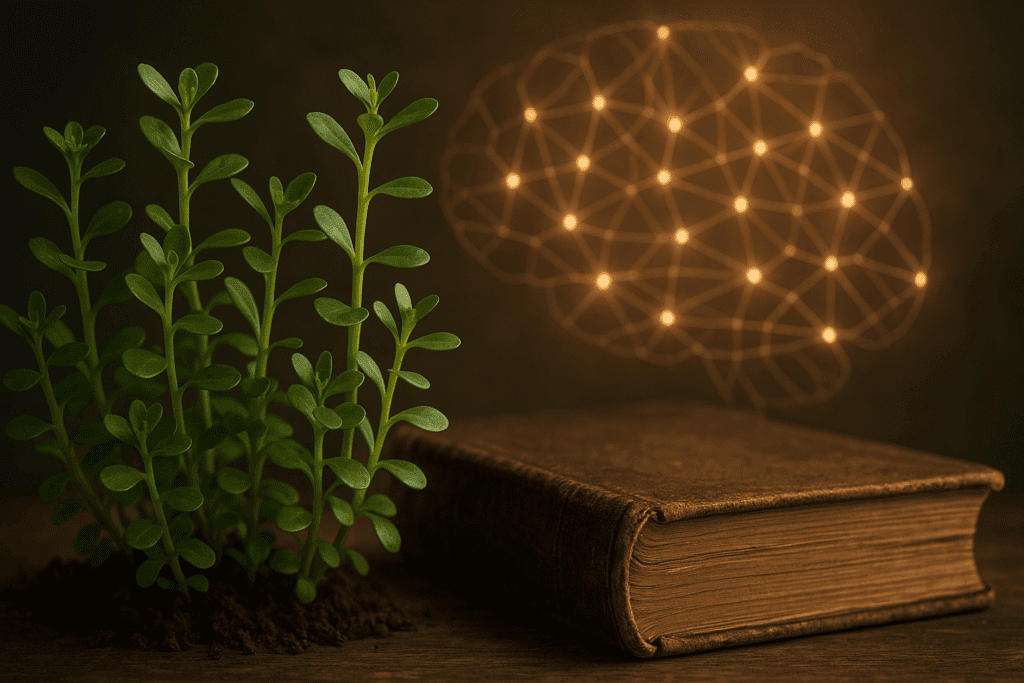Attention Deficit Hyperactivity Disorder (ADHD) affects millions globally, with an increasing number of adult women receiving diagnoses later in life. Historically understudied in female populations, ADHD in women often presents with subtle symptoms such as emotional dysregulation, internalized anxiety, and chronic disorganization rather than hyperactivity. This divergence in symptom expression highlights the importance of developing tailored, evidence-based strategies for managing ADHD that align with women’s unique physiological and psychological profiles. In this exploration of the best herb for ADHD, we delve into nature’s pharmacy for solutions that may support cognitive focus, memory retention, and mental clarity.
You may also like: Best Herb for ADHD Support: How Natural Remedies and Herbs for ADHD Women May Help Boost Focus and Calm
The Challenge of ADHD in Women: A Complex Neurobiological Puzzle
ADHD in women often goes unrecognized until adulthood, where it emerges in the form of persistent overwhelm, executive dysfunction, and emotional sensitivity. These symptoms not only impact productivity but also contribute to chronic stress, sleep issues, and impaired academic or professional performance. As a result, women may seek alternatives or complements to pharmaceutical interventions, particularly when dealing with side effects or contraindications. Herbal medicine, supported by centuries of traditional use and emerging clinical evidence, offers a rich field of exploration for natural support options.
Herbs that affect neurotransmitter balance, cerebral blood flow, and stress modulation have received growing attention in the search for non-stimulant strategies. Particularly, herbs that support dopamine and norepinephrine function or reduce cortisol levels are of interest due to their relevance in ADHD pathophysiology. Integrating these options requires a nuanced understanding of their mechanisms, safety, and interactions.

Bacopa Monnieri: An Adaptogen Rooted in Cognitive Tradition
Bacopa monnieri, also known as Brahmi in Ayurvedic medicine, is a well-studied adaptogen that shows significant promise for improving cognitive performance in individuals with attention difficulties. Research has shown that Bacopa may enhance memory consolidation, reduce anxiety, and support learning capabilities—functions directly linked to academic and workplace demands. For women wondering how to remember information for exams or how to remember what they study, Bacopa’s neuroprotective and memory-enhancing properties make it a compelling option.
One of Bacopa’s primary mechanisms involves modulating the cholinergic system and promoting synaptic communication. Additionally, Bacopa has been found to reduce oxidative stress in the brain and improve cerebral blood flow, enhancing neural resilience and focus. By supporting working memory and recall, it indirectly aids in how to memorize notes and how to remember things for exams.
Ginkgo Biloba: Enhancing Circulation and Cognitive Clarity
Ginkgo biloba has long been celebrated for its role in cognitive enhancement. Its unique ability to improve blood flow to the brain and modulate neurotransmitter systems such as dopamine and norepinephrine makes it particularly relevant for those struggling with focus and processing speed. For female students or professionals curious about how to remember information for a test or how to remember what you read for exams, Ginkgo may offer a natural cognitive boost.
Its flavonoids and terpenoids help protect nerve cells from damage and support mitochondrial function, which is critical for sustained mental energy. Moreover, studies suggest that Ginkgo may help regulate mood and reduce symptoms of anxiety, which are often co-morbid with ADHD in women. This dual benefit positions Ginkgo as a powerful herb for holistic mental clarity and memory support.

Rhodiola Rosea: Combating Mental Fatigue and Boosting Attention
Known for its anti-fatigue effects, Rhodiola rosea is another adaptogenic herb gaining popularity among those managing attention disorders. It works by modulating cortisol levels and increasing cellular energy production, both of which are essential for maintaining cognitive performance under stress. This makes Rhodiola a valuable ally for students wondering how to memorize something for a test or how to memorize for exams without burnout.
In clinical settings, Rhodiola has demonstrated the ability to enhance mental alertness, reduce reaction time, and improve sustained attention. These effects can be particularly useful for those who need to remember things while studying or stay focused during long periods of concentration. By enhancing resilience to stress, Rhodiola indirectly supports academic and professional success in women with ADHD.
Gotu Kola: Supporting Cognitive Function and Neuroplasticity
Gotu Kola, also known as Centella asiatica, is another traditional herb with growing scientific support for its cognitive benefits. It has been shown to stimulate dendritic growth and support the formation of new neural connections, an essential function for learning and memory. This makes it especially helpful for individuals exploring how to remember stuff when studying or how to remember information for exams efficiently.
Gotu Kola’s calming effect on the nervous system can help regulate anxiety and promote focus without sedation, a quality that differentiates it from many pharmaceutical options. It also appears to influence neurotransmitters like GABA and serotonin, contributing to emotional regulation. For women balancing hormonal shifts and cognitive demands, Gotu Kola presents a gentle yet effective herbal alternative.

Lemon Balm and L-Theanine: Calming the Mind for Improved Focus
Lemon Balm (Melissa officinalis) and L-Theanine, an amino acid found in green tea, are two natural compounds known for their calming yet focus-enhancing properties. While not traditionally categorized under ADHD herbs, their ability to reduce anxiety and improve alpha brainwave activity makes them useful for managing stress-induced cognitive disruption. This can be crucial for learners working on how to memorize for a test or how to remember what u study in high-pressure environments.
Both compounds have demonstrated efficacy in improving working memory and attention span in clinical studies. Their synergy is particularly effective for individuals prone to racing thoughts or emotional overwhelm, common experiences among women with ADHD. By promoting a calm but alert state, they help optimize cognitive performance when it matters most.
Practical Integration: Creating a Holistic Herbal Protocol for ADHD
Developing a personalized herbal strategy for ADHD involves more than choosing a single supplement. For sustainable results, it’s important to consider dosage, bioavailability, and synergy with other lifestyle interventions such as sleep hygiene, nutrition, and time management. Many students and professionals exploring how can you remember what you study or how to remember notes effectively can benefit from combining cognitive herbs with structured study routines and mindfulness practices.
Consulting with a licensed herbalist or integrative medicine practitioner ensures that chosen herbs are safe, especially for women who may be pregnant, breastfeeding, or using hormonal contraception. Adjustments based on individual response, life stage, and symptom expression are crucial for long-term success.

The Role of Diet and Nutrients in Enhancing Herbal Benefits
While herbs can provide targeted support, they work best when layered atop a nutrient-rich diet that supports brain health. Nutrients such as magnesium, zinc, omega-3 fatty acids, and B vitamins play a crucial role in neurotransmitter synthesis and cognitive function. These nutrients support foundational processes that enhance the effectiveness of herbal interventions. For anyone working to understand how to memorize things fast for exam success or how to remember things while studying, ensuring nutritional sufficiency is a non-negotiable cornerstone.
Foods such as leafy greens, nuts, seeds, fatty fish, and berries help reduce inflammation, stabilize blood sugar, and promote optimal brain chemistry. Integrating these into daily meals can elevate the cognitive impact of herbs while promoting overall wellness.
Emotional and Hormonal Considerations Unique to Women
Women with ADHD often face unique cognitive challenges linked to hormonal fluctuations across the menstrual cycle, pregnancy, and menopause. These changes can affect neurotransmitter activity and alter the way symptoms manifest. Herbs that support hormonal balance, such as chasteberry or maca, may offer additional support in managing cognitive performance. Addressing these patterns holistically allows for more nuanced answers to the question of how to remember what you read for exams or how to remember stuff when studying amid life transitions.
Recognizing the interplay between emotional regulation, hormonal rhythms, and cognitive function provides a more comprehensive roadmap for long-term ADHD management. Emotional self-awareness, journaling, and therapeutic support can also amplify the benefits of herbal and nutritional strategies.
Lifestyle Foundations for Cognitive Enhancement
No herb can replace the foundational pillars of mental performance: quality sleep, physical activity, and stress management. Sleep in particular is vital for memory consolidation and executive function. For those wondering how to remember information for a test or how to memorize for exam success, improving sleep hygiene may be as critical as any herbal intervention.
Exercise has been shown to boost dopamine sensitivity and neuroplasticity, making it a powerful adjunct for women with ADHD. Similarly, mindfulness practices such as meditation, yoga, and breathwork help reduce anxiety and sharpen attention, enhancing the effectiveness of herbal and nutritional support strategies.

Frequently Asked Questions: Natural Support for ADHD and Memory Enhancement in Women
What are some lesser-known strategies for how to remember information for exams using natural herbs?
While mainstream strategies for how to remember information for exams often emphasize flashcards and repetition, incorporating nootropic herbs like lion’s mane mushroom or ashwagandha may further enhance memory retention. Lion’s mane is especially known for supporting neurogenesis, helping create the neural pathways necessary for long-term learning. Ashwagandha helps regulate cortisol, allowing the brain to function optimally under stress, which is crucial during exam periods. When combined with spaced repetition and active recall, these herbs may offer a more sustainable approach to how to memorize for exams. Importantly, combining herbs with mindfulness during study sessions has shown to increase the encoding of information, supporting both focus and recall.
How can emotional regulation improve how you remember what you study?
he link between emotional regulation and memory is often overlooked, but mood stability significantly influences how you remember what you study. Chronic anxiety can suppress the brain’s ability to consolidate memories effectively, which is especially relevant for women with ADHD. Integrative approaches such as using nervine herbs like passionflower or lemon balm can support calmer emotional states, creating a fertile ground for learning. When learners are emotionally regulated, their brain’s executive functions perform better, enhancing their ability to focus and retain information. Therefore, learning how to remember what u study involves more than just repetition—it requires managing stress and cultivating emotional clarity.
Is there a difference in how to remember notes versus how to remember what you read for exams?
Yes, the cognitive strategies differ. How to remember notes often involves active review and synthesis, such as rephrasing content in your own words, while how to remember what you read for exams leans more on comprehension and contextual understanding. Herbal support can enhance both pathways: ginseng may sharpen short-term memory crucial for notes, while gotu kola may strengthen comprehension. Incorporating aroma-based memory cues (like peppermint or rosemary essential oil during study and exam sessions) can further bridge memory encoding and retrieval. Understanding these different mechanisms allows students to use memorization techniques for students more effectively and strategically.
Can diet impact how to memorize for exam success, even when using herbs?
Absolutely. While herbs like Bacopa monnieri may enhance cognitive clarity, they function optimally when the brain is well-nourished. Deficiencies in B vitamins, omega-3 fatty acids, or iron can undermine memory function, regardless of the herbs used. A diet rich in leafy greens, fatty fish, and whole grains supports neurochemical balance, laying the groundwork for herbs to take effect. To better understand how to memorize for a test or how to memorize something for a test, students should view nutrition as foundational, not supplementary. For maximum impact, pair dietary choices with personalized herbal support.
What role does body rhythm play in how to remember things while studying?
Your body’s circadian rhythm deeply influences cognitive performance. Research shows that studying during your peak alertness period (which varies individually) improves how to remember things while studying. Herbs like Rhodiola rosea help regulate energy and stress hormones, allowing you to adapt your study sessions around your body’s natural flow. Evening learners may benefit from calming herbs like lemon balm to aid retention without overstimulation. Recognizing and working with these internal rhythms transforms how to remember things for exams into a more personalized and effective process.
Are there specific herbs that help with how to memorize notes quickly?
Yes, herbs like rosemary, sage, and peppermint have traditionally been used to enhance mental clarity and fast memory recall. These are ideal for situations where quick retention is required, such as last-minute study reviews or presentations. Their natural compounds stimulate acetylcholine activity, which plays a key role in how to memorize notes effectively. Drinking herbal infusions or using essential oils while reviewing flashcards is a great way to reinforce memory pathways. For students researching how to memorize things fast for exam success, these fast-acting herbal aids can be particularly valuable.
How can I build a routine around herbs to improve how do you remember things for a test?
To improve how do you remember things for a test, establish a consistent herbal regimen at least four weeks before the exam period. For example, take Bacopa in the morning for memory and Rhodiola before afternoon study sessions to sustain focus. Night-time herbs like chamomile or ashwagandha can improve sleep, aiding overnight memory consolidation. Pair this with cognitive activities like teaching the material to someone else, which reinforces how to remember stuff when studying. Structured usage amplifies the herbs’ effectiveness and minimizes reliance on short-term cramming strategies.
What cognitive techniques pair well with herbs for how to memorize for a test?
Herbs enhance cognitive performance, but combining them with strategic techniques yields stronger results. Visualization, the method of associating information with vivid mental images, helps with how to remember information for a test when combined with herbal support. Another technique is the memory palace method, where learners imagine placing concepts in physical locations within a familiar space. When paired with memory-enhancing herbs, these practices significantly improve how to remember things for exams. The synergy of mental training and herbal aid creates long-term benefits beyond immediate academic needs.
How do herbs influence memorization techniques for students with ADHD?
Students with ADHD often struggle with sustaining attention and organizing information, which affects how to memorize for exam success. Herbs like Ginkgo biloba and Panax ginseng may support executive function by enhancing prefrontal cortex activity. These changes improve the brain’s ability to engage with complex memorization techniques for students, such as creating study narratives or using interleaving methods. For women with ADHD especially, the hormonal interplay with cognitive load can be buffered by calming herbs that regulate neurotransmitters. This multi-pronged approach makes it easier to internalize how to memorize something for a test effectively.
Can herbal support improve how to remember stuff when studying over long academic periods?
Yes, long-term academic goals require sustained cognitive resilience, which certain herbs are well-suited to support. Adaptogens like holy basil and schisandra can enhance stress resilience and reduce mental fatigue across semesters. For how to remember stuff when studying regularly, building herbal cycles aligned with your academic calendar ensures that your cognitive energy stays balanced. These herbs are especially beneficial during final exam prep, where the challenge isn’t just how to remember notes, but how to maintain performance over weeks of intensive learning. Adding herbs to a study plan fosters consistency, clarity, and cognitive durability.

Final Thoughts: A Personalized Path to Cognitive Clarity and ADHD Support
For women navigating the complexities of ADHD, the integration of evidence-based herbal remedies provides a promising path toward enhanced focus, memory, and emotional resilience. The search for how to memorize notes or how to remember things for exams becomes less daunting when supported by a toolkit that includes Bacopa, Ginkgo, Rhodiola, and other botanicals known for their nootropic properties.
Yet the journey is highly individual. A herb that works wonders for one person may be less effective for another, emphasizing the importance of a flexible, integrative approach. When layered with good nutrition, consistent lifestyle habits, and emotional self-care, these natural solutions offer more than symptom management—they offer empowerment.
Ultimately, choosing the best herb for ADHD isn’t about chasing a miracle cure, but about aligning natural tools with your unique cognitive landscape. With mindful application and support from qualified professionals, it’s entirely possible to optimize memory, sharpen focus, and thrive in both academic and everyday life.


